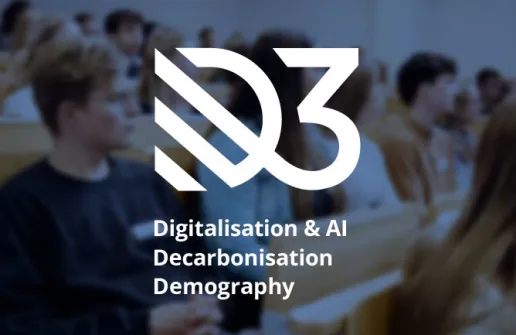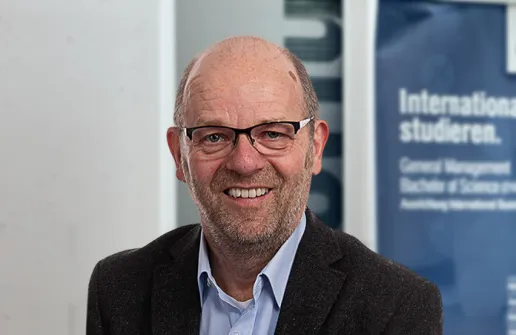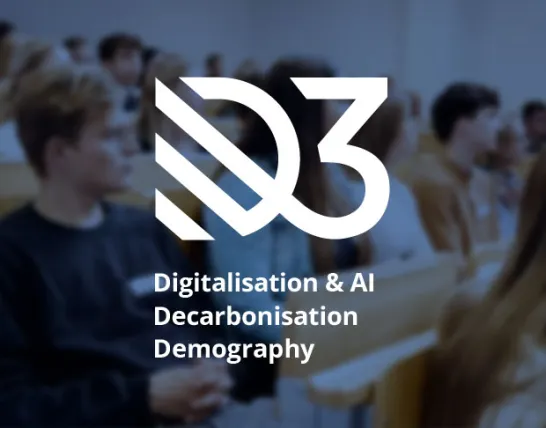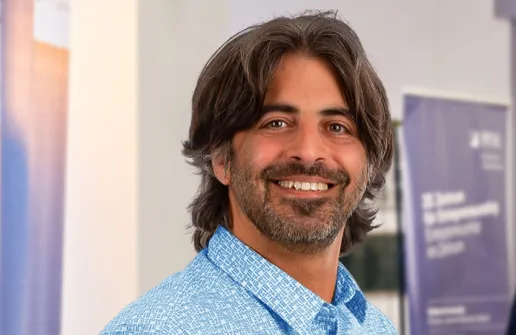Our focus on three future-shaping trends
Since our university was founded in 1994, we at PFH have been committed to providing new impulses in the fields of science and education: our range of courses has always been tailored to the real needs of the job market. Over the past 30 years, the demands placed on study programmes by students and employers have changed significantly. Simultaneously, future decision-makers are increasingly being tasked with finding effective and innovative solutions in business, society and politics for the three defining trends of our time:
- Digitalisation & AI
- Decarbonisation
- Demography
„The 3 Ds come with high demands on people‘s willingness to change and their adaptability. This harbours numerous opportunities, but also triggers uncertainties. One of the tasks of psychology will be to provide well-founded risk and opportunity assessments as well as advice and interventions to help encourage and enable people to recognise potential opportunities and actively influence outcomes.”
Prof. Dr. Anja Christina Lepach-Engelhardt
Developmental and Educational Psychology


These global forces, more than any other developments, are shaping our times and represent the key challenges that society as a whole must overcome at national and global level. After all, it goes without saying that we not only need to conserve our natural resources, but continue maintaining our quality of life in the face of international competition at the same time. As these trends are already permeating all areas of life and work, they are therefore highly relevant for you and future graduates in all fields of study.
Digitalisation & AI, Decarbonisation, Demography - Our goals with D3
The focus of our research and teaching content at PFH is consistent with those of decarbonisation, demographic development and digitalisation. With our groundbreaking D3 concept, you are now not only in a position to acquire specialised professional qualifications, but also superior skills that prepare you thoroughly for the most pressing challenges of our time. Your studies are given a clear "purpose" – something that is of utmost importance.
Our D3 slogan – “Make your studies count – today and in the future” – emphasises the high relevance of our degree programmes for professional practice in a global and social context. For us, it‘s not just about knowledge, but also about ensuring that your studies have a relevant objective and a real sense of purpose.
D3 at PFH
D3 Lecture Series
Every semester, PFH organises a cross-departmental lecture series for internal and external audiences. The lectures illustrate how closely the topics of decarbonisation, demographic development and digitalisation are interlinked. PFH regularly welcomes speakers who add exciting presentations to the semester‘s lectures and provide insights into the business and sustainability strategy of their companies, e.g., to date:
• Brenntag SE
• Symrise AG
• Novelis
D3 Focus Days
Each semester, three focus days are devoted to one of the three Ds with external partners (companies, scientists, etc.). In these workshops, questions are jointly addressed in order to provide students with practical experience in trending topics.
D3 Excursions
Every semester, and within the D3 framework, excursions take place to well-known companies in a variety of sectors, e.g.:
• Lufthansa:
Excursion to Lufthansa headquarters in Frankfurt at the invitation of Christina Foerster, Head of Brand Management and Sustainability at the Lufthansa Group, with lunch and a tour of the Lufthansa Aviation Centre.
• Salzgitter AG:
Discussion with Sandrina Sieverdingbeck, Managing Director of the German Ore and Metal Union (DEUMU), on climate-neutral steel production in Lower Saxony as well as a tour of the plant.
• Elli – A brand of Volkswagen:
Interview with Giovanni Palazzo, CEO of Elli, about the digitalisation of power supplies and the smart charging infrastructure in Germany.
D3 Research at PFH
You receive a comprehensive introduction to D3 at the start of your studies. In this manner, we highlight its relevance for all fields of study and professions and illustrate how PFH focuses on the three fields in its degree programmes.
D3 Research Papers
The professors regularly publish research papers from the D3 ecosystem at PFH and thus provide stimuli for usage in practice.
D3 Certificate
The PFH offers a certificate course on D3 through its Management Academy. This innovative further education programme prepares managers in business, administration and politics for the key challenges of the future.
D3 Lectures
PFH professors regularly give lectures related to D3 at conferences, seminars, trade fairs, etc., and emphasise the relevance of their teaching and research field to D3.
D3 Awards
The best Bachelor‘s and Master‘s theses directly related to D3 are selected each year and honoured with prize money.

„PFH‘s D3 initiative emphasises how practice-oriented and "in keeping with the times" studying at our university is. I look forward to meeting the students and giving them the knowledge and skills they need to solve the challenges ahead of us in the most effective way possible.”
Prof. Dr. Hubert Schüle
Business Information Systems and E-Business
„With its clear orientation towards D3, PFH differs markedly from other universities. D3 runs through our entire strategy and above all, of course, through our tutoring. Thus, our students are provided with the clear advantage of being highly qualified for the most important challenges of our times, enabling them to positively shape the future with their careers.”
Prof. Dr. Julian Voss
Professor, Innovations Manager and Initiator of D3 at PFH

What does D3 mean?
... means using data and algorithmic systems to improve or redesign processes, products and business models. The four dimensions of digitalisation - digital products, digital processes, digital networking and digital business models - are an integral part of PFH‘s study programmes. They help to accelerate decarbonisation and find solutions to the challenges of demographic change. Digital technologies promote social participation, ensure mobility in rural areas and reduce energy consumption.
... has become an integral part of work and everyday life. At PFH, we attach great importance to using AI consciously, responsibly and always in accordance with the principles of scientific practice. We qualify our students in particular, but also our team, in the confident use of AI and raise awareness of ethical and legal aspects. We promote the use of of AI in scientific work (e.g., Bachelor‘s and Master‘s theses as well as in teaching and learning processes), whereby transparency and reflection are paramount.
AI continues to develop very dynamically. Therefore, we always maintain an open and constructive dialog about this area and continuously adapt our orientation framework.
... is the word used to describe a system implemented for stopping or reducing carbon gases, especially carbon dioxide, from being released into the atmosphere as the result of an industrial, chemical or engineering process. More precisely, it refers to the conversion to an economic system that sustainably reduces and offsets carbon dioxide (CO2) emissions. Decarbonisation is a keyword in the sustainability strategy of many companies in order to mitigate the rise in global temperatures and reduce man-made CO2 emissions as quickly as possible.
The decarbonisation of the economy is closely linked to the targets of the Paris Climate Agreement, which aims to limit global warming to significantly less than 2 degrees by 2050. Technological innovation is the foundation for decarbonisation and our degree programmes in the field of ‘Technology’ provide all the required future skills to develop solutions for a “Decarbonisation Transformation”.
... is a contemporary challenge for the economy, society and politics. Buzzwords such as ‘fewer’, ‘older’ and ‘more colourful’ describe how demographics are changing - with diverse effects on families, healthcare, the labour market and educational opportunities as well as the provision of local supplies and mobility. And all this not just in Germany.
PFH contributes to solving these challenges with its degree programmes. These include, for example, future-oriented learning, international study programmes for the integration of qualified specialists into the labour market, the creation of better framework conditions for families and, not least, the compatibility of work and family life thanks to our Social Work degree programme.


„In clinical psychology in particular, great progress is being made with digitalisation, e.g., in the case of anxiety or trauma-related disorders. Digitalisation has been a major part of my research and teaching for years. I want to encourage and empower our studentrs to recognise these opportunities and actively shape these processes.”
Prof. Dr. Youssef Shiban
Clinical Psychology with a focus on Therapy Research
Learn more about our D3 concept
In our brochure, we show you in more detail how we integrate D3 into teaching, research, knowledge transfer and continuing education. Find out now what students and lecturers at our university love about the D3 concept.
Get your free info package in just 2 minutes

